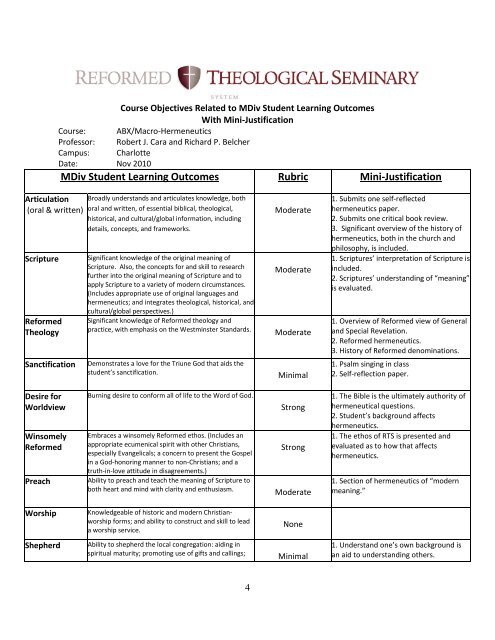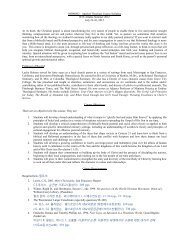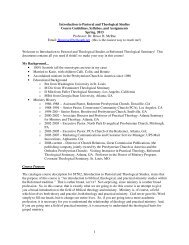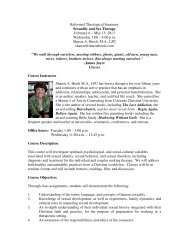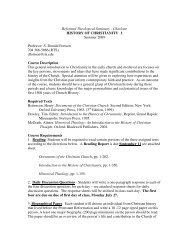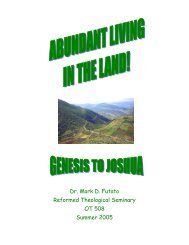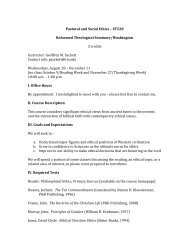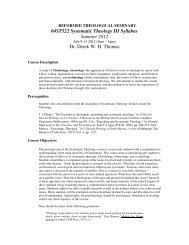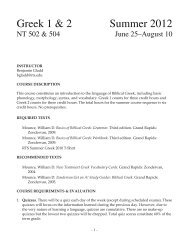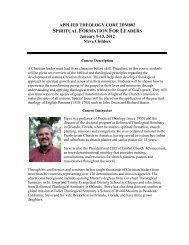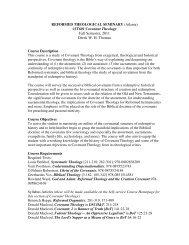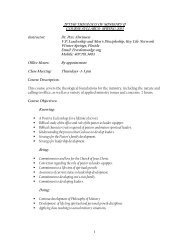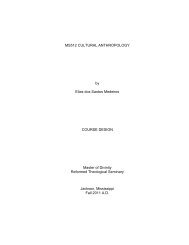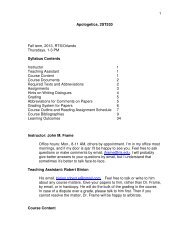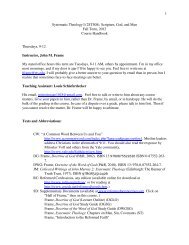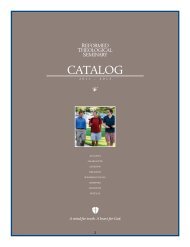MACROâHERMENEUTICS - Reformed Theological Seminary
MACROâHERMENEUTICS - Reformed Theological Seminary
MACROâHERMENEUTICS - Reformed Theological Seminary
You also want an ePaper? Increase the reach of your titles
YUMPU automatically turns print PDFs into web optimized ePapers that Google loves.
Course:<br />
Professor:<br />
Campus:<br />
Course Objectives Related to MDiv Student Learning Outcomes<br />
With Mini-Justification<br />
ABX/Macro-Hermeneutics<br />
Robert J. Cara and Richard P. Belcher<br />
Charlotte<br />
Date: Nov 2010<br />
MDiv Student Learning Outcomes Rubric Mini-Justification<br />
Articulation<br />
(oral & written)<br />
Scripture<br />
<strong>Reformed</strong><br />
Theology<br />
Sanctification<br />
Broadly understands and articulates knowledge, both<br />
oral and written, of essential biblical, theological,<br />
historical, and cultural/global information, including<br />
details, concepts, and frameworks.<br />
Significant knowledge of the original meaning of<br />
Scripture. Also, the concepts for and skill to research<br />
further into the original meaning of Scripture and to<br />
apply Scripture to a variety of modern circumstances.<br />
(Includes appropriate use of original languages and<br />
hermeneutics; and integrates theological, historical, and<br />
cultural/global perspectives.)<br />
Significant knowledge of <strong>Reformed</strong> theology and<br />
practice, with emphasis on the Westminster Standards.<br />
Demonstrates a love for the Triune God that aids the<br />
student’s sanctification.<br />
Moderate<br />
Moderate<br />
Moderate<br />
Minimal<br />
1. Submits one self-reflected<br />
hermeneutics paper.<br />
2. Submits one critical book review.<br />
3. Significant overview of the history of<br />
hermeneutics, both in the church and<br />
philosophy, is included.<br />
1. Scriptures’ interpretation of Scripture is<br />
included.<br />
2. Scriptures’ understanding of “meaning”<br />
is evaluated.<br />
1. Overview of <strong>Reformed</strong> view of General<br />
and Special Revelation.<br />
2. <strong>Reformed</strong> hermeneutics.<br />
3. History of <strong>Reformed</strong> denominations.<br />
1. Psalm singing in class<br />
2. Self-reflection paper.<br />
Desire for<br />
Worldview<br />
Winsomely<br />
<strong>Reformed</strong><br />
Preach<br />
Burning desire to conform all of life to the Word of God.<br />
Embraces a winsomely <strong>Reformed</strong> ethos. (Includes an<br />
appropriate ecumenical spirit with other Christians,<br />
especially Evangelicals; a concern to present the Gospel<br />
in a God-honoring manner to non-Christians; and a<br />
truth-in-love attitude in disagreements.)<br />
Ability to preach and teach the meaning of Scripture to<br />
both heart and mind with clarity and enthusiasm.<br />
Strong<br />
Strong<br />
Moderate<br />
1. The Bible is the ultimately authority of<br />
hermeneutical questions.<br />
2. Student’s background affects<br />
hermeneutics.<br />
1. The ethos of RTS is presented and<br />
evaluated as to how that affects<br />
hermeneutics.<br />
1. Section of hermeneutics of “modern<br />
meaning.”<br />
Worship<br />
Knowledgeable of historic and modern Christianworship<br />
forms; and ability to construct and skill to lead<br />
a worship service.<br />
None<br />
Shepherd<br />
Ability to shepherd the local congregation: aiding in<br />
spiritual maturity; promoting use of gifts and callings;<br />
Minimal<br />
1. Understand one’s own background is<br />
an aid to understanding others.<br />
4


